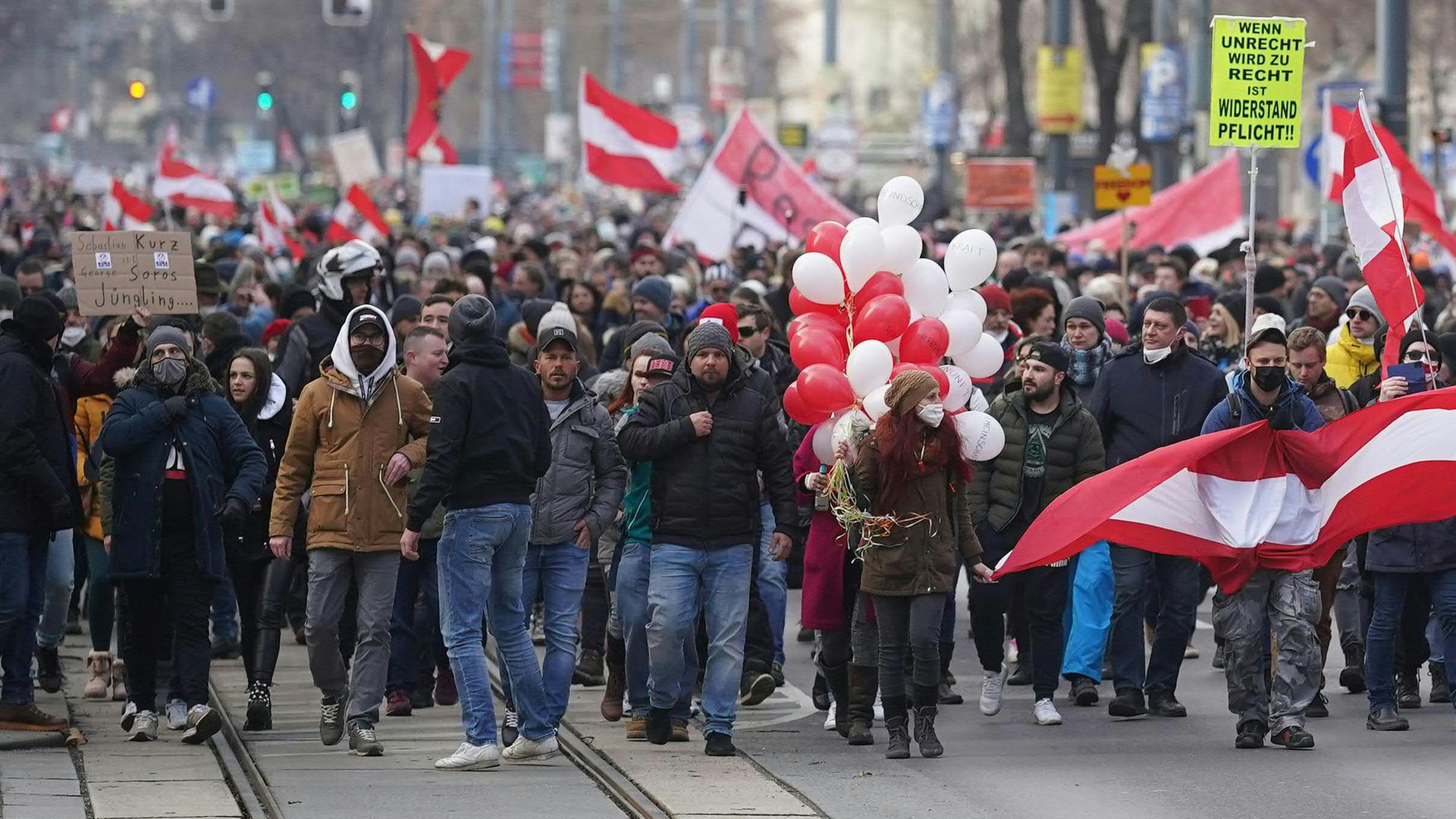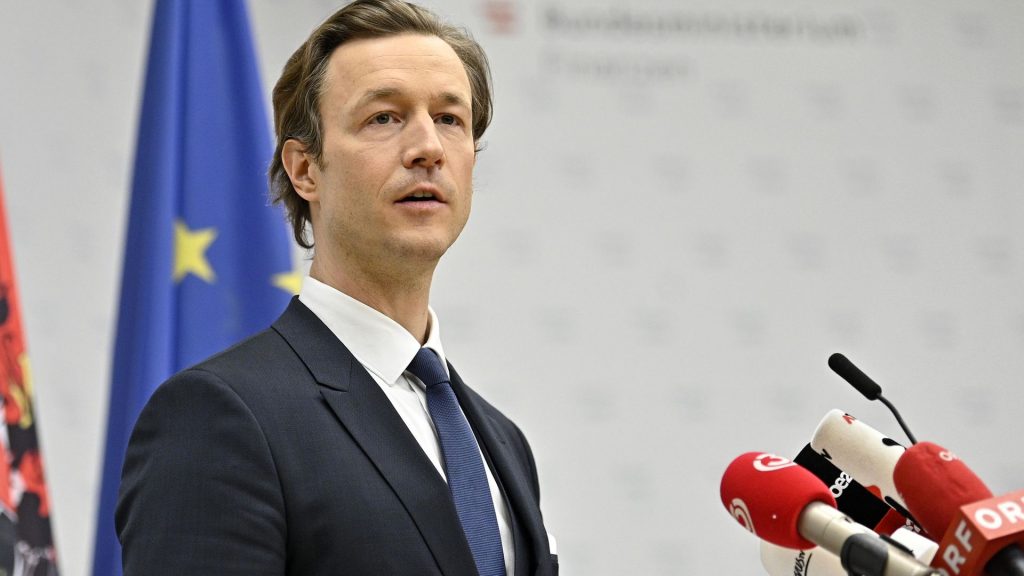
As a senior minister becomes mired in a major corruption case, what is it about the country that makes it so susceptible to such scandals?
When Austrian chancellor Sebastian Kurz’s first government was capsized in 2019 by the corruption of his coalition partners, it was largely shrugged off as the sort of accident that happens in Austria’s scandal-prone politics. But allowing his second administration to be similarly jeopardised looks worse than careless.
And this time the allegations of impropriety are a lot nearer to home, as graft investigators probe claims of collusion with the Novomatic gambling company by Kurz’s closest colleague, finance minister Gernot Blümel.
Whatever the ultimate outcome, this case is already undermining the young chancellor’s image as a new broom sweeping away the cronyism that has long blighted the Austrian political system.
In early February, Austria’s WKStA prosecution bureau ordered a raid by anti-fraud police and forensic experts on Blümel’s home. He was subsequently named as a chief suspect in a wide-ranging and complex corruption inquiry known in Austria as the ‘casinos case’.

Prosecutors say they are focusing on claims that Blümel pressed the Italian government to alleviate Novomatic’s considerable financial woes in Italy, in exchange for donations from the firm to organisations affiliated with Kurz and Blümel’s Austrian Peoples Party (ÖVP). He denies any wrongdoing.
Ominously for Kurz, he was also named on the search warrant, which hints that the prosecutors may also be exploring the chancellor’s own connections to Novomatic. The proximity of this investigation to Kurz means that the scandal is potentially more wounding to him than the one that felled his previous administration.
The ‘Ibizagate’ affair featured the leader of the far-right Freedom Party (FPÖ), Heinz-Christian Strache, being covertly filmed in a villa on the Balearic island touting lucrative business concessions in exchange for funding to a woman posing as the niece of a Russian oligarch. The scandal ended the FPÖ’s stint as Kurz’s coalition partner and forced Strache’s resignation as vice chancellor.
Ultimately, Ibizagate did little political damage to Kurz. He was freed from his controversial alliance with the FPÖ, won the subsequent election and was able to form a new government with the more wholesome Green Party as his junior partner.
The dirt from the affair largely stuck to the FPÖ instead. Moral rectitude is not a value most Austrians associate with a party that was founded in 1955 by ex-Nazi SS officers.
Distancing himself from the casinos case will be more difficult for Kurz. In a strong show of chutzpah, the chancellor says the investigation is itself driven by the system of political cronyism it is seeking to unveil, and which lies behind many of the scandals that repeatedly pepper Austrian politics. According to Kurz, the case is a flimsy one that is being unjustly fuelled by his political opponents working within the prosecutors’ office.
Kurz’s claim has some traction on public opinion because of the legacy of Austria’s post-war political system of ‘proporz’, from Proportionalität, ‘proportionality’. This was initially conceived as a way of averting a recurrence of the vicious left and right wing ideological infighting of the 1920s and early 1930s that opened the way for Nazism in Austria.
It involved the two dominant parties of the second half of the 20th century, the Christian democrat-aligned ÖVP and their centre-left social democrat counterparts, the SPÖ, devising a system in which thousands of public sector roles were shared out between their respective party members in a manner proportional to their electoral support.
This method of equalising the political influence of each party expanded to include posts in nationalised industries, trade unions, business organisations, broadcasters and local government. Until 1999, it was even written into the constitutions of most of the federal states of which the country is composed.
Proporz initially succeeded in building stability in a country emerging from the turmoil of the Second World War and finding itself on the front line of the new Cold War struggle between the West and the Soviet bloc.
Almost inevitably though, the preordained composition of most administrative and other important bodies reduced democratic accountability. It also created conflicts of interest between public service and loyalty to the political party to which many influential people owed their jobs.
The system began to break down a couple of decades ago, when criticism of proporz as a corrupting mechanism for political patronage and nepotism increased and the smaller parties that did not benefit from it, such as the FPÖ, Greens and liberals, began to attract more support.
The formal dismantling of the system, however, has left an enduring cultural legacy of behind-the-scenes influence peddling and mutual back-scratching that may take much longer to shift. Indeed, there is a popular perception in Austria that corruption has worsened over recent years to encompass more of the private sector, particularly the country’s powerful gambling companies.
A further strand of the casinos case being investigated by prosecutors is the role politically connected individuals at Casinos Austria AG, another giant gambling firm, played in attempts to water down the gaming laws. And one of FPÖ leader Strache’s most memorable utterances on the Ibiza tapes was “Novomatic pays everyone”. The companies refute these allegations.
What is harder to dispute is that Austria’s legislation on political funding is feeble and open to abuse. The small but increasingly prominent Neos liberal party has seized upon this issue by putting transparency and tackling cronyism at the heart of its platform.
Its MPs are at the forefront of the parliamentary committee that has also been set up to investigate the casinos case. Neos leader Beate Meinl-Reisinger is one of the most vocal figures calling on Blümel to resign, saying that a man “whose house had to be searched in connection with the gambling case cannot remain finance minister and must face the consequences”.
Chancellor Kurz, of course, begs to differ and has no intention of sacrificing his closest political friend and ally. As yet, Kurz’s personal popularity has barely been dented and his ÖVP party’s poll ratings remain well-ahead of its closest rivals, although they have slipped by a few percentage points over the last couple of months.
Nonetheless, Kurz is in a difficult political position that could worsen if more evidence about the casinos case emerges. The investigation undermines his claims to represent a new generation that is doing away with Austria’s unhealthy political pathologies. And whilst his attack on the WKStA prosecutors for being politically partisan sounds plausible to many Austrians, it also carries a double-edged reminder of how he has failed thus far to reform the system fully.
This crisis comes on the back of the resignation of the government’s Labour minister, Christine Aschbacher, in January, following a plagiarism scandal and heavy criticism of the intelligence services by an official inquiry into the terrorist attack on Vienna last November.
Questions are also starting to be asked about the Kurz administration’s handling of Covid, with Austria’s economy being one of the worst impacted in Europe by the pandemic.
Whilst the casino case still has some way to run, a wider narrative of failure and sleaze is already beginning to build around a chancellor who has hitherto been considered a breath of fresh air and unassailable. Even if Kurz’s substantial skills enable him to overcome these problems, the investigation is once again revealing how far Austria has to go to escape the perpetual scandals its political system is predisposed to generate.
PROPS TO PROPORZ?
In 1999, ‘Proporz’ was chosen as Austria’s ‘word of the half century’. (The jury tasked with the selection could not agree on a ‘word of the century’).
Proporz was said to have “shaped Austrian politics and social life like no other term since 1945”, and represented “the exact opposite dynamic than existed previously in political life”. Even by the turn of the century, however, the system was waning, as Austria’s stark division into ‘red’ (SPÖ) and ‘black’ (ÖVP) camps faded.
In 1999, two states, Salzburg and Tyrol repealed their form of Proporz. Others have since followed.
CASINO COUNTRY
While Austrians themselves are not among Europe’s biggest gamblers, the country does have two extremely powerful gaming firms, Casinos Austria and Novomatic. They have domestic dominance, as Austria gives licences only to companies base there, and blocks foreign competition. This gave both firms a strong base from which to expand overseas and become some of the bigger casino operators worldwide. For instance, Casinos Austria was particularly well-placed to move in on the vacant Eastern European market when it opened up in the early 1990s.
What do you think? Have your say on this and more by emailing letters@theneweuropean.co.uk









